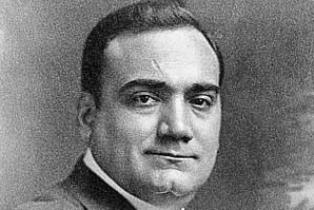
WTI Magazine #32 2014 May, 29
Author : Giuseppina Salzano e Giovanni Verde Translation by:
Music, bel canto, opera. A piece of Italian art in the world can be summed up in one great name, known and appreciated everywhere: Enrico Caruso. Enrico was born in Naples on February 25, 1873.
Eighteenth son in a twenty-one children family, he is the first to survive: his seventeen elder brothers were not able to overcome childhood. The father, metalworker, immediately insists that Enrico will have to work as metalworker too. It is the mother who will direct him towards the arts and to ensure that Enrico will receive his first singing lessons.
At age 15 the singer loses his mother, killed by tuberculosis. Her premature death represents, at the same time, pain and fuel for his sublime art. Enrico would later say: "Life gives me a lot of suffering. Those who have never felt anything, they cannot sing".
During the last years of the XIX century he meets the soprano Ada Giachetti Botti, with whom he has a long relationship, and two children. Ada leaves Caruso to escape with his driver and tries, with him, to extort money from the singer.
After singing in the theaters of Caserta, Naples and Salerno, Enrico Caruso makes his debut at the Lyric theatre of Milan, La Scala, in 1898. Then a long tour starts, during which he will perform in Russia, Lisbon, Rome, Monte Carlo, at Covent Garden in London, then in Buenos Aires.
Caruso will be the first singer to make a record. He decides to record ten of them, with opera songs on behalf of the UK label Gramophone & Typewriter Company. It will be the first artist in music history to sell over a million records, thanks to his extraordinary interpretation of the air "Vesti la giubba" from the opera "Pagliacci"by Ruggero Leoncavallo. His sublime " Ridi, pagliaccio, sul tuo amore infranto"! With its powerful and emotional voice, it will remain one of the most well-known verses ever sung in the world.
Even for Enrico Caruso, the United States will be the place of his final consecration. The great tenor arrives at the Metropolitan Opera in New York on November 23, 1903, interpreting the Duke of Mantua in Verdi's "Rigoletto". The public will repeatedly ask to sing again the air "La donna è mobile".
He becomes a real idol, a symbol of the talent which goes on stage at the Metropolitan. His fame will grow with every interpretation: "Aida", "Tosca", "La Boheme", "Pagliacci" and "La Traviata" in 1903; "Lucia di Lammermoor" and "L'Elisir d'amore" in 1904.
It will be Caruso himself to ask the jeweler Tiffany & Co. to produce gold medals with his profile, to celebrate his performances at the Met and let him give them to his close friends. The partnership with the United States will continue throughout his career. In 1918 he married an American girl, Dorothy Benjamin, with whom he had a daughter, Gloria.
Caruso will begin to have health problems at the end of a tour in 1920. He will be suffering from a lung infection that will cause him bleeding, even on the scene. However, he will decide not to cancel the scheduled shows, despite his serious physical problems. He will die in a room at Hotel Vesuvio in Naples, on August 2, 1921.
Enrico Caruso is still the standard for excellence. The Italian singer Lucio Dalla, who died a few years ago, dedicated to him one of the most well-known Italian songs, "Caruso". The song, poignant and poetic, very well shows the extraordinary blend of passion and pain that marked the life of a legend of the music all over the world: Enrico Caruso.



